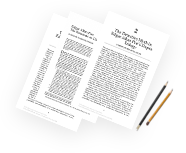250 TO 350 WORDS USE CITATIONS IN PARAGRAPH
Who owns your cells? When they are in your body, it’s not much of a question. Does the answer change if they have been taken for testing?
Henrietta Lacks was a 31-year-old mother of five when she died in 1951 of a particularly fast-moving form of cervical cancer. Doctors treating her at Johns Hopkins Hospital took samples of her cancer cells for study. Ms. Lack’s cell line was the first human cell line to grow in a lab environment and went on to help develop the polio vaccine, chemotherapy, in vitro fertilization, and much more. Does the magnitude of these scientific achievements outweigh the fact that doctors did not obtain consent from Ms. Lacks?
To prepare for this Discussion, review the Grady article in this week’s Learning Resources, -Second Opinion: A Lasting Gift to Medicine That Wasn’t Really a Gift” on the case of Henrietta Lacks and the famous “HeLa” cell line.
Post a comprehensive response to the following:
- In your opinion, who owns the results of research (the cells, the cell lines)? Support your rationale using ethical principles.
- Should Henrietta Lacks’ descendents receive remuneration for the products resulting from the research conducted with HeLa cells? Support your rationale with legal principles.
- If Ms. Lacks had given informed consent, would your opinion change?
____________________________________________________________________________________
RESOURCES
Judson, K., & Harrison, C. (2016). Law and ethics for the health professions. (7th ed.). New York: McGraw-Hill.
- Chapter 11, “The Beginning of Life and Childhood” Few topics spark greater ethical debate than genetics and the concept of when life begins. This chapter examines various hot-topic issues related to genetics and our ever-advancing technological capabilities.
Medical Law, Ethics, and Bioethics for the Health Professions”
- Chapter 14, “Genetic Engineering”This chapter takes another look at some of the controversies surrounding the issue of genetic engineering.
- Chapter 15, “Reproductive Issues”
Devine, C. (2010). Tissue rights and ownership: Is a cell line a research tool or a person? Retrieved from http://stlr.org/2010/03/09/tissue-rights-and-ownership-is-a-cell-line-a-research-tool-or-a-person/
Feldman, R. (2010). Whose Body is it Anyway? Human Cells and the Strange Effects of Property and Intellectual Property Law Stanford Law Review, Forthcoming. Retrieved from SSRN: http://ssrn.com/abstract=1731648
Grady, D. (2010, February 1). Second opinion: A lasting gift to medicine that wasn’t really a gift. The New York Times.
Note: Retrieved from the Walden Library databases.
How do you balance major benefits to medical research with an individual’s fundamental rights? This article provides an excellent overview of the Henrietta Lacks story.
Harmon, A. (2010, April 22). Tribe wins fight to limit research of its DNA. New York Times.
Note: Retrieved from the Walden Library databases.
This article profiles the Havasupai Indians” (an Arizona Native American tribe) victory in a lengthy battle with a state university to limit research conducted on tribe members” DNA.
Truog, R., Kesselheim, A., & Joffe, S. (2012). Paying tissue donors: The legacy of Henrietta Lacks. Science. 337(6090) 37-38. Retrieved from http://www.ncbi.nlm.nih.gov/pmc/articles/PMC4256075/
Optional Resources
Audio Podcast: Gross, T. (2010, February 2). “Henrietta Lacks”: A donor’s immortal legacy [Audio podcast]. Retrieved from http://www.npr.org/2010/02/02/123232331/henrietta-lacks-a-donors-immortal-legacy
Rebecca Skloot: The Immortal Life of Henrietta Lacks
Photos http://rebeccaskloot.com/book-special-features/photos/
Rebecca Skloot: The Immortal Life of Henrietta Lacks
Audio/Video
Expert Solution Preview
Introduction:
The case of Henrietta Lacks and the use of her cells without her consent raises important ethical and legal questions regarding ownership and compensation. Henrietta Lacks’ cell line, known as HeLa, has been instrumental in numerous scientific achievements, including the development of the polio vaccine, chemotherapy, and in vitro fertilization. However, the fact that the doctors did not obtain consent from Ms. Lacks raises concerns about the ownership of the cells and the compensation owed to her descendants. In this response, we will explore the ethical and legal principles that can guide our understanding of these issues.
In my opinion, the individual who provides the cells, in this case, Henrietta Lacks, should own the results of the research conducted using those cells. Ethical principles such as autonomy and respect for persons support this rationale. Autonomy refers to an individual’s right to make decisions about their own body and how it is used. By taking Ms. Lacks’ cells without her consent, her autonomy was violated, and therefore she should be recognized as the owner of those cells and the results of the research conducted using them.
In terms of compensation, legal principles come into play. According to legal principles of property rights, individuals have a right to own and control the use of their own property, including their cells. Therefore, Henrietta Lacks’ descendants should receive remuneration for the products resulting from the research conducted with HeLa cells. This is supported by the concept of intellectual property rights, which allows individuals and their heirs to benefit financially from the commercialization of their cells and the products derived from them.
If Ms. Lacks had given informed consent, it would change the ethical perspective. Informed consent is an essential ethical principle in research, as it respects an individual’s autonomy and right to make decisions about their own body. If Ms. Lacks had given informed consent, it would mitigate the violation of her autonomy and ownership rights. However, it is important to note that the issue of compensation for her descendants would still be relevant. Informed consent does not negate the need for fair compensation for the use of an individual’s cells in research.
In conclusion, the case of Henrietta Lacks raises important questions about ownership and compensation for the use of cells in research. Based on ethical principles such as autonomy and respect for persons, the individual who provides the cells should own the results of the research conducted using those cells. Moreover, legal principles of property rights support the notion that Henrietta Lacks’ descendants should receive remuneration for the products resulting from the research. While informed consent would change the ethical perspective, it does not eliminate the need for fair compensation.




